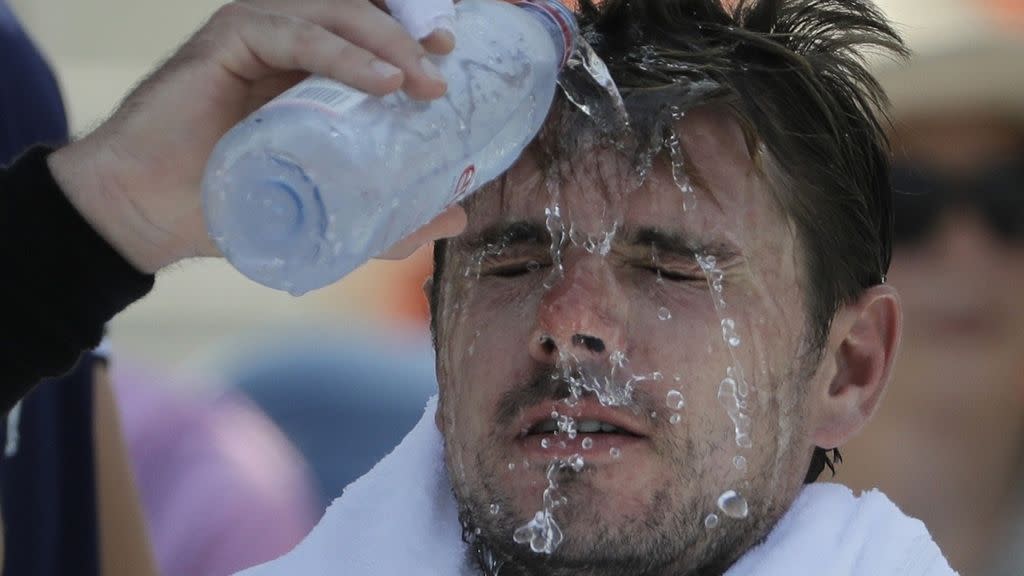‘Fears of dying on court’: Heatwave poses serious risks for athletes at Paris Olympics

As Europe swelters in an early heatwave, concerns are mounting about what Paris’s weather will be like during the upcoming Olympics.
The event, kicking off on 24 July, could become the hottest Games on record, posing risks of serious illness and even death to athletes.
A new report, Rings of Fire: Heat Risks at the 2024 Paris Olympics, describes the 34C temperatures at the 2021 Games in Tokyo as “a window into an alarming, escalating norm for Summer Olympics”.
“Competitors vomited and fainted at finish lines, wheelchairs were deployed to carry athletes away from sun-scorched arenas and the fear of dying on court was even raised mid-match by the Tokyo Games’ No 2 seeded tennis player Daniil Medvedev,” the report says.
In 2003 in July and August – the same period during which the 2024 Olympics will be held – a record heatwave caused over 14,000 excess deaths in France.
According to a recent report in the Lancet, Paris’s population is the most at risk of dying from heatwaves than any other capital in Europe.
Will there be a heatwave during the Paris Olympics?
In May, French meteorological service Météo France forecast higher than normal temperatures for June to August across the country and particularly hot and dry conditions along the Mediterranean coast where some Olympics events will be held.
In late May, France experienced sweltering temperatures with Biarritz in the south west hitting 30C. It also saw severe hailstorms which carried on into June.
As another scorching summer looms, is Paris ready for the 2024 Olympics?
Solar panels on old buildings: How is Paris 2024 keeping a lid on Olympics emissions?
Across Europe, heatwaves have hit earlier than ever this year, with Greece, Cyprus, Türkiye and Italy already hit by extreme heat, with some places seeing temperatures 10C above the seasonal average.
Although medium-term forecasts are not always accurate - the weather across Europe is extremely changeable with countless different influencing factors - meteorologists can use weather models and data for general trends including monthly temperature averages to make predictions.
The risk heatwaves pose to athletes
As temperatures creep up, athletes' bodies are put under increasing pressure. Heat and humidity make it more difficult for competitors to regulate their core body temperature.
This reduces physical performance, especially in endurance sports.
Hundreds of Hajj pilgrims reported dead amid lethal heatwave
Hiking experts’ tips for staying safe in hot weather after five tourists die in Greek heatwave
For those competing outside during a heatwave, there is an increased risk of sunburn, heat exhaustion and heat cramps.
In particularly serious cases, severe heatstroke can be life-threatening.
Athletes at the Paris Olympics will have 'no air conditioning'
With the Paris Games aiming to be the “greenest in Olympic history”, officials have opted to use natural systems to ensure that indoor temperatures are at least 6C lower than outside temperatures.
This includes scheduling events at cooler times of day and ensuring indoor venues are built with climate change in mind.
It also means that several buildings including the Athletes’ Village, a purpose-built complex in the northern suburbs of Paris, will not be equipped with air conditioning.
Instead, designers have installed a geothermal cooling system.
“A geothermal network has been developed to supply the Village's buildings: the energy produced (68 per cent of which is renewable) will provide both heating and cooling for the accommodation, offices and housing that will be built within these walls after the Games,” Paris 2024 says.
This will work alongside other measures including solar films, high-performance joinery and the overall design of the Village.
If this proves insufficient, athletes will be provided with backup solutions such as fans.
With these systems, even if it’s 39C outside, organisers say they can achieve their target indoor temperature of 23 to 26C.
For some delegations, however, that isn’t cool enough to keep a competitive edge and teams such as Greece and Australia have suggested they will bring their own portable air conditioners.


